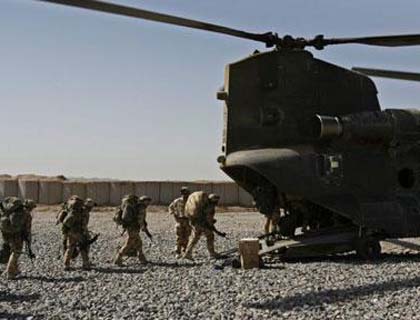The military and intelligence assessments about Afghanistan’s post-2014 security indicate that there may be troubles for Afghan security forces in sustaining the achievements of one last decade. A new intelligence assessment released by US intelligence agencies suggest that the security achievement gained during one last decade in Afghanistan may begin to unravel after US-led NATO forces leave Afghanistan in 2014. The National Security Estimates depicts a gloomy prospect for Afghanistan’s security from now on as it predicts increasing influence for the militant groups and the warlords.
The intelligence estimate, which is independently assessed for providing factual information and analysis to the US administration, says that the situation in Afghanistan will quickly deteriorate if the Afghan government and the United States fail to conclude a bilateral security agreement that guarantees continued flow of international aid to Afghanistan. The alarming intelligence assessment of the situation in Afghanistan is coming shortly after a top British military official warned that the Taliban may regain control of some areas in southern Afghanistan they lost in recent years to NATO forces after the international alliance leaves Afghanistan by end of the next year.
These assessments compound to the already-existing concerns about what will happen after withdrawal of foreign troops as the Afghan national security are going to shoulder the burden of war against the hard-headed insurgency alone. In contrary to the skepticisms existing about the future, it seems highly unlikely that the Taliban gains control of vast territories and threaten the central government in Kabul. Afghan and Americans are increasingly optimistic about the capability and efficiency of Afghanistan’s national security forces to sustain the fight against the Taliban after NATO withdrawal.
Despite the fact that Afghanistan’s security will continue to face an implacable insurgency for years to come, the pessimisms that Afghanistan may fall into chaos seem unlikely. Many may miss the point that, in fact, Afghanistan’s security forces are now capable enough to keep the insurgent groups at bay and protect the nation. Afghanistan will have a 352,000 army and police force to protect the country and fight against the insurgency while being assisted by Afghanistan’s international allies.
There is no consensus about the bleak intelligence predictions about Afghanistan beyond 2014 even among American officials. It seems there is a huge rift among American military commanders and intelligence analysts. While the analysts predict a gloomy future for Afghanistan’s drive against the insurgency, the war commanders on the ground seem more optimistic about Afghan national security forces’ capability to preserve the ground and fight the Taliban. Many US officials believe that the intelligence assessment may have gone too far than finding the realities about Afghanistan’s current situation. These officials do not seem to agree with the grim prospect for Afghanistan’s security depicted in the new intelligence assessment.
However, what there is a consensus about is that it is quite possible the impasse of Taliban insurgency will continue for years to come. Most likely, Afghan National Security Forces will remain engaged in fighting the Taliban for years to come. In this fight, they will direly need assistance from the United States and other NATO member countries. Afghanistan’s army and police will not be able to efficiently sustain the war against the impalpable insurgency without robust security cooperation between Afghanistan and the United States. Because of this and other convincing justifications that Afghanistan should seek stronger security cooperation with the international supporters to avert any such predictions of security deterioration.
Still, the widespread concerns about Afghanistan’s shaky security and the prospect of its future stability seem to be to some extent real and genuine. Given the current security situation and the unresolved standoff over the security deal between Afghanistan and the United States, it is obvious that Afghanistan’s National Security Forces will have a tough task ahead to overcome the insurgency. This would not be easy without help from the US and its allied nations in NATO.
Given that the report has been published at a time of differences between Kabul and Washington, the Afghan government may consider it as a tactical move meant to pressure Afghanistan for signing the bilateral security agreement with the United States. To some extent, it might be case, and the US may be deliberately exerting pressures on the Afghan government to sign the security agreement. Apart from the United States’ tactical and purposeful pressures, the intelligence predictions provide unarguable evidences that the ongoing war in Afghanistan will remain highly shaky and reversible in the years to come. Given the increasing war weariness in Washington, the assessment is coming at the right time recommending US policymakers in the White House and the Senate to take decisions appropriate to what must be done for preserving the hard-gained achievements of the one last decade.
Since the assessment is conducted by analysts of US intelligence agencies, it makes sense to notice its findings and heed its captions. There evidences are abundant that require Afghanistan to take these intelligence assessments more seriously. One, and not the least, is that Afghan security forces are finding the anti-insurgency fight very tough and challenging without US forces. The ongoing war is taking a high toll from the Afghan forces. Along the high rate of attrition among Afghan forces, this suggests that the Afghan security forces remain vulnerable and needs robust support from NATO after 2014 to sustain the fight against the Taliban.
